The Possibilities of Naming the World are the Possibilities of Caring for It: The importance of indigenous Peoples’ languages in the protection of knowledge and ecosystems.
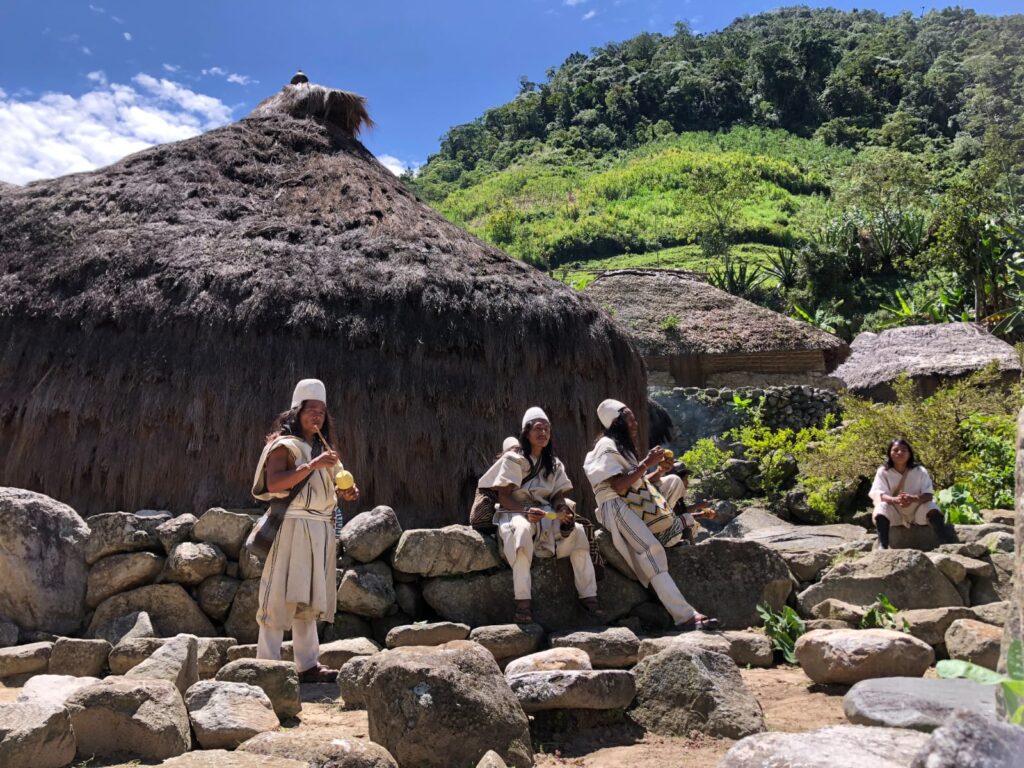
Indigenous Peoples languages not only strengthen social cohesion and the transmission of values and community practices, but they also preserve systems of knowledge essential for the safeguarding of the planet. Their preservation is crucial, not only for the cultural identity of each people but also for the balance and conservation of nature. By: Guriwun Torres* Indigenous Peoples’ languages are a reflection of the culture of their speakers, their cosmovisions, and knowledge. They contain wisdom about how, where, and when to use the resources and goods of nature, making them essential in ecological protection and conservation, as well as in the harmonious relationship between Indigenous Peoples and their environment. These languages are the main medium through which knowledge, the history of their Peoples, and their territories have been passed down from generation to generation, acting as custodians and sources of cultural heritage. They represent the very language in which the inherent relationship between the spiritual world and the material world is expressed, a vision that guides Indigenous Peoples’ understanding of nature, the universe, and everything contained within it. This knowledge has allowed for the preservation of biodiversity and ecosystems in various regions of the world. It is no coincidence that many areas with high biodiversity are also rich in cultural diversity, represented by Indigenous Peoples and linguistic diversity. A clear example of this is the Sierra Nevada de Santa Marta, ancestral territory of the Indigenous Peoples Arhuaco, Kogui, Wiwa, and Kankwamo, who speak three Indigenous Peoples’ languages: Ikun, Kogui, and Dámana. Its high level of endemism and biodiversity in flora and fauna, documented by biologists and ecologists, demonstrates how cultural practices and traditional knowledge have been fundamental in its conservation. From my experience as an Indigenous woman and as a biologist, I have found and understood that there is no more intimate and profound way to understand cosmovisions and knowledge than by exploring them through the language itself. The language guards deep layers of cultural knowledge. For example, in the Arhuaco people, when the Mamos (spiritual authorities) teach or explain an idea related to the cosmovision – whether it is about a natural phenomenon, an object, an animal, a plant, or a star – they do so in a language that is not everyday language, but one that is more precise and specialized. An example is the concept Seyn zare (seyn = related to the night, zare = past suffix), which literally translates as “when everything was darkness.” This expression refers to the beginning of time, when everything was darkness, and everything existed only in thought and spirit, when the norms that govern nature and the universe in the present began to be established. This word is often translated as “Law of Origin,” a concept fundamental to explaining the norms and laws that govern the mission and mandate of the Arhuaco People in the care of life. To understand this type of knowledge, it is not enough just to speak the language; a prior understanding and a broad mastery of the vocabulary are required to grasp and access these concepts. When it is necessary to comprehend these uncommon terms in everyday life, seeking someone with this knowledge, who can interpret and explain in a more accessible language, becomes an indispensable option. Therefore, the extent of knowledge can only be fully grasped to the degree that one’s understanding permits and as much as those with the wisdom are willing to share. When these concepts are translated without this level of depth, they are often oversimplified, losing key ideas and nuances. Protecting Indigenous Peoples’ languages is essential to preserving the richness and depth of ancestral wisdom. In the Arhuaco or Iku people, the language is called ikun, which means “to speak in the language of the Iku.” However, when it comes to transmitting knowledge and ideas, it is referred to as ga’kunamu, which literally translates to “carrier of the message/idea.” This reflects that the ideas explaining the cosmovision of all aspects surrounding the Arhuaco are contained in the ga’kunamu. Therefore, when an Arhuaco refers to their own language, they say niwi ga’kunamu, which can be translated as “our ideas,” “our thoughts,” or “our language,” depending on the context. All of these forms of knowledge are expressed and developed in everyday life, influencing collective decision-making and the defense of territory, which is the very manifestation of culture. Thus, the Arhuaco mission is to safeguard the natural balance of the planet through rituals, payments, dances, and the strict observance of the Law of Origin, which is transmitted through the language or ga’kunamu. These practices seek respect and reciprocity with Mother Earth, the universe, and all its beings, which constitute biodiversity and ecosystems. It is understood then that within the language resides the knowledge of biodiversity and the sustainable use of resources, encompassing everything from the most everyday aspects to the most complex elements of the cosmovision. This knowledge is deeply connected to the territories that Indigenous Peoples inhabit, conserve, and protect. Indigenous Peoples’languages carry the knowledge of the land inhabited by their speakers. The specificity in the naming of geographical features—rivers, lakes, lagoons—and the beings that make up the landscape—plants, animals, fungi, insects, rocks—not only reflect their uses but also their connection to the history and cosmogony of each being. This speaks to the complexity with which these cultures understand nature. For example, in the Ikun language, the puma (Puma concolor) is called gwiajina, a compound word whose literal meaning is “older brothers,” gwia = older brother, and the suffix jina = plural. Why are they called older brothers? For the Arhuaco cosmovision, these felines are the first inhabitants of the territory, considered Mamos, guardians of the kunsamu, knowledge and wisdom that are preserved in the mountains, high moors, and snowy peaks of the Sierra Nevada de Santa Marta, which are their Kunkurwas or ceremonial homes. Although most Indigenous Peoples do not have a written tradition, there are knowledge systems that have been documented in geoglyphs and paintings, whose shapes and
Defensa de los derechos de las mujeres Indígenas a través del sistema de las Naciones Unidas
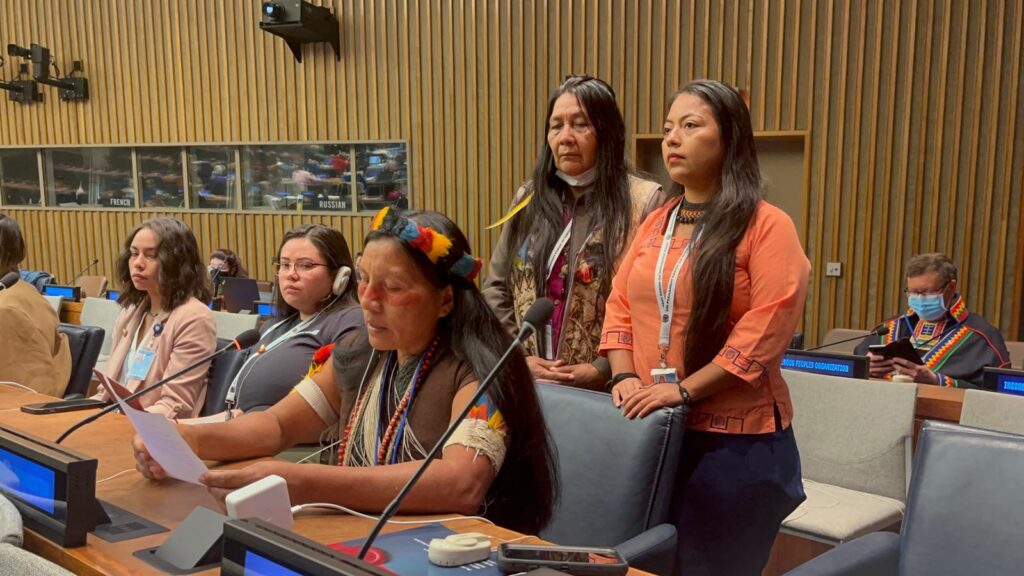
Certificado por la Universidad de Arizona Desarrollado en colaboración entre Land is Life y la Universidad de Arizona, este curso ofrece una oportunidad de aprendizaje para mujeres indígenas de las siete regiones socioculturales, brindándoles experiencia práctica en la interacción y navegación dentro del sistema de derechos humanos de las Naciones Unidas. Los estudiantes aprenderán de ponentes de alto nivel, incluidos Relatores Especiales de la ONU, líderes Indígenas y académicos distinguidos. Fechas tentativas para las presentaciones de los ponentes invitados: Semana Fecha Tema Semana 1 Marzo 20 de 2025 Marco Legal Semana 2 Marzo 27 de 2025 Declaración de las Naciones Unidas sobre los Derechos de los Pueblos Indígenas (DNUDPI) Semana 3 Abril 3 de 2025 Abogacía: Mecanismo Experto sobre los Derechos de los Pueblos Indígenas y el Foro Permanente de las Naciones Unidas para las Cuestiones Indígenas. Semana 4 Abril 10 de 2025 Procedimientos Especiales Semana 5 Abril 17 de 2025 Órganos de Tratados Semana 6 Abril 24 de 2025 Examen Periódico Universal (EPU) Semana 7 Mayo 1 -7 de 2025 Presentaciones Finales de los Participantes
An important announcement

Dear Friends, After an extensive search process, in which we received over 100 applications from around the world, Land is Life’s Board of Directors is pleased to announce the appointment of Luisa Castaneda as our next Executive Director, effective January 1, 2025. In her new role, Luisa joins us in our mission to advance the self-determination and collective rights of Indigenous Peoples in the seven socio-cultural regions of the world. We are confident that under her leadership, the organization’s success and impact in achieving its mission and vision will continue to flourish. Luisa was born and raised in Puerto Boyacá, Colombia. She has a Master’s in Law from the Libre University, Colombia and an LLM in Comparative Law and Economics from the University of Turin and IUC, Italy. Currently, as a Vanier scholar, she is finalizing her Doctorate in Comparative Law at McGill University. Luisa has over a decade of experience in supporting Indigenous Peoples: advocating for the territorial rights of the Arhuaco People in Colombia through strategic litigation; championing food sovereignty as part of the Indigenous Peoples Unit at FAO; and working as an Advisor to the Chairperson of the UN Permanent Forum on Indigenous Issues, Dario Mejia Montalvo. Luisa joined the Land is Life team in 2023, and has demonstrated that her commitment and vision make her an exceptional individual for the role of Executive Director. We would also like to express our appreciation to Land is Life’s founding Director, Brian Keane, for leading the organization during this transition period, during which he expanded our work to protect Indigenous Peoples’ rights defenders in the Amazon, and created and launched our Indigenous Women’s Program, Indigenous Women’s Fellowship, and Food Sovereignty and Security Program. Brian will rejoin Land is Life’s Board of Directors, and continue working with the organization in the role of Senior Advisor. We invite you to join us in welcoming Luisa Castaneda and look forward to your continued support and engagement as we embark on this exciting new chapter. Mariam Wallet Med Aboubakrine Board Chair Land is Life
Stop the 11,000 MW Siang Dam: Honor Indigenous Rights In Arunachal Pradesh, India
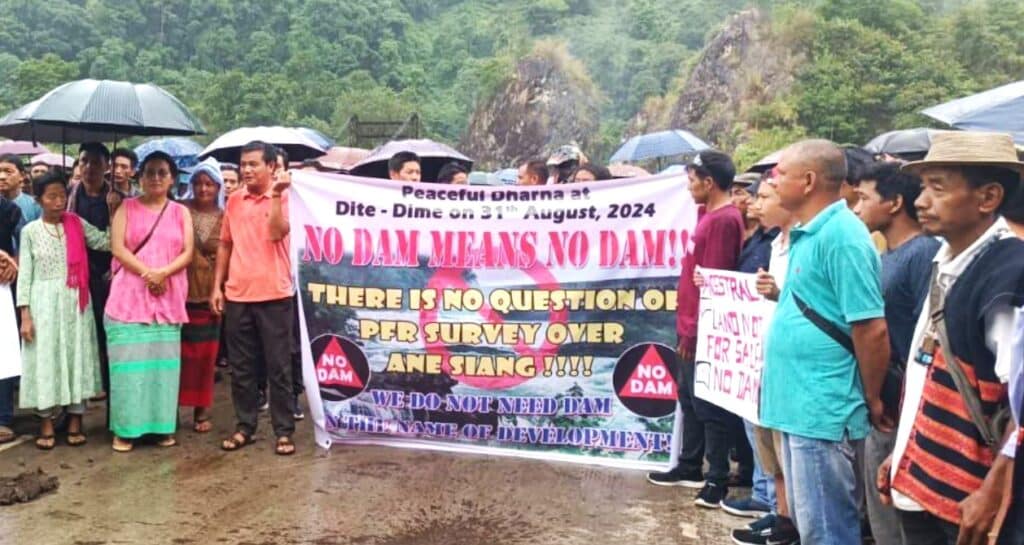
Land is Life calls on the Government of India to reconsider the pursuit of the 11,000 MW Siang Hydroelectric Project and other large-scale dams in Arunachal Pradesh and across North East India. It is deeply concerning that the Government of India is pushing forward with the construction of the Siang Dam on the Siang River without securing the free, prior, and informed consent of the Adi and other affected Indigenous Peoples in Arunachal Pradesh. The Adi tribe has called for the recognition of their rights, urging consideration of the potential impacts of the dam on their land, livelihoods, culture, and identity, particularly regarding involuntary displacement, land grabbing, the influx of non-Indigenous populations, and militarization. They have further called for a halt to the dam’s construction on their ancestral lands and territories. The Government of Arunachal Pradesh’s notification on December 6, 2024, to deploy Central Armed Police Forces in Siang District to facilitate the Pre-Feasibility Study of the Siang Dam has alarmed the Adi people. They view this notification as a direct attack on democratic decision-making processes in development and as an undemocratic resort to force. The Adi people are also deeply concerned about the potential for repressive actions and other human rights violations due to the militarization of their territory. The proposed 11,000 MW Siang Dam would have severe social, environmental, and cultural consequences for the Adi Indigenous Peoples and their land. In addition to the local impacts, the dam would cause significant downstream effects, such as widespread flooding in Assam. The disaster risk posed by the dam is further heightened by the region’s high seismic activity and the effects of climate change, including glacier melting and deforestation in the Himalayan region. Land is Life urges the Government of India to halt the 11,000 MW Siang Hydroelectric Project and to cease the militarization of Indigenous territories for dam construction. The demands of the Adi Indigenous Peoples must be fully respected, in line with the UN Declaration on the Rights of Indigenous Peoples, 2007.
In Memoriam Leonard Imbiri

On November 23, at 1:23 am, our brother Leonard Imbiri passed away. Leo lived his life in a good way, struggling against injustice, working for future generations, and bringing hope to the Indigenous Peoples of Papua. Leo was part of the Land is Life family for over two decades. As Executive Director of Yayasan Anak Dusun Papua (YADUPA), and Chair of Dewan Adat Papua (Papua Customary Council), he worked tirelessly to defend human rights and advance the self-determination of the forgotten Peoples of West Papua. Leo made it a priority to build the capacity of, and support, Indigenous women and youth; reminding us of the key role that women play in the struggles of the Papuan Peoples, and the importance of nurturing the development of Papua’s future leaders. Leo was fearless. He continued his work – always moving forward – despite continuous threats and harassment. He brought the voices of the Papuan people to those in power in Jakarta, New York and Geneva. He traveled the world to forge alliances with other Indigenous Peoples, touching the lives of countless Indigenous leaders working under similarly dangerous conditions. Wherever he went, Leo brought smiles to the faces of everyone he met. He was full of humor, humility, and optimism. Leo’s work will carry on. His legacy will grow.We mourn the passing of our good friend. We celebrate his life. We send our prayers and condolences to his family.Papua Merdeka!
Bittersweet Sugar in Papua

Deforestation for sugar projects in Merauke, Source: Yayasan Pusaka Sugar is often synonymous with sweetness, enhancing and strengthening the flavor of food. But will the same outcome occur in Papua, where the land and its Indigenous Peoples are increasingly being eroded for the interests of the National Sugar and Bioethanol Development Project? The land of Papua has long been a target for various parties seeking to control and exploit its resources—not only what is on the surface but also what lies beneath the earth. This often disregards the existence of the Indigenous Papuan People, who have managed and protected the land for generations. One thing that continues to grow stronger over time is the government’s ambition to develop large-scale agricultural and plantation lands in Papua. Looking back, this ambitious project was initiated in 2006 when former President Susilo Bambang Yudhoyono declared the Merauke Integrated Rice Estate project in Merauke Regency, Papua Province. This involved allocating 3.2 million hectares of land to be converted into rice fields and plantations. The project ultimately failed and was replaced in 2010 by the Merauke Integrated Food and Energy Estate (MIFEE), which allocated 2.5 million hectares and added energy elements such as wood chips and palm oil to attract investors. Under President Joko Widodo’s administration, the government re-declared the Food Estate project in Papua, with the aim of developing corn, rice fields, and sugarcane plantations across West Papua and South Papua Province. Additionally, through Presidential Decree Number 15 of 2024, concerning the Task Force for the Acceleration of Sugar and Bioethanol Self-Sufficiency in Merauke Regency, South Papua Province, the government has outlined the implementation of the National Sugar Self-Sufficiency and Bioethanol Provision Program. This mega-project is already underway, with 2 million hectares of land reserved for development, placing it within the National Strategic Project and Special Economic Zone scheme. Symbolic opening ceremony by President Joko Widodo, Source: Media The seriousness of this government initiative is evident, given that Indonesia is still a sugar-importing nation. In 2023, sugar imports totaled 5 million tons, with Thailand, India, Brazil, and Australia as the largest suppliers. Meanwhile, national sugar production stands at only 2.4 million tons per year, a figure that continues to decline. National sugar requirements in 2023 reached 3.2 million tons per year, meaning that imports are currently the only solution to this deficit. This situation is also tied to Indonesia’s commitment to national energy independence, with a focus on new renewable energy sources. In 2025, Indonesia aims for a renewable energy mix of 23%, which will increase to 31% by 2030. This energy transition is expected to be fueled by biodiesel from palm oil and bioethanol from sugarcane. These two major goals—achieving self-sufficiency in sugar production and advancing energy independence—are the driving forces behind the government’s push for this large-scale project. However, the government’s claims of eradicating poverty and overcoming the backwardness of Papuan society are often used to legitimize these development projects in the region. This national-scale project places new pressure on South Papua, a province newly formed in 2022 after the expansion of Papua Province under Law Number 14 of 2022. South Papua consists of four regencies: Merauke, Boven Digoel, Mappi, and Asmat. As a new province, South Papua must prioritize development for its people. However, it is currently being forced to accommodate the mega Food Estate Project intended for rice and sugarcane cultivation. Haji Isam, owner of Jholin Group (middle with hat and black glasses), guarded by armed military in Food Estate Location Name of Company Concession (Ha) Allocation PT Global Papua Abadi 30.777 Sugar cane plantation, sugar mill and bioethanol PT Andalan Manis Nusantara 60.786 Sugar cane plantation, sugar mill and bioethanol PT Semesta Gula Nusantara 66.056 Sugar cane plantation, sugar mill and bioethanol PT Borneo Citra Persada 50.772 Sugar cane plantation PT Global Papua Makmur 60.364 Sugar cane plantation, sugar mill and bioethanol PT Murni Nusantara Mandiri 52.395 Sugar cane plantation and sugar mill PT Berkat Tebu Sejahtera 60.342 Sugar cane plantation PT Agrindo Gula Nusantara 60.679 Sugar cane plantation PT Sejahtera Gula Nusantara 60.606 Sugar cane plantation Company operated in Cluster 3 Several large companies, including WILMAR, KPN Corporation, Jhonlin, and First Resources, have also committed to partnering with the government through the PTPN Corp holding in this consortium. Consent from Indigenous Peoples Indigenous Peoples in South Papua are heavily dependent on forests. However, their land is increasingly threatened by the large-scale privatization and development projects carried out by the government and private sector. Indigenous Peoples claim they were not properly informed or consulted about the food estate plan, and many were shocked to learn of the land clearing operations. As customary landowners, they feel pressured to support the government’s grand plan. It appears they have no choice but to accept the loss of their land and forests, which have sustained them for generations. Papuan Indigenous Peoples traditionally rely on sago as their primary food source, not rice. Forcing Papuan land to become a rice producer, by replacing forests and sago with rice fields, will disrupt the community’s wisdom, production and consumption patterns, and ultimately their traditions. Harvesting Sago as collective efforts of Papuan Indigenous Peoples. Source: Kompas This situation seems like an ongoing tragedy—Indigenous Peoples will watch from the sidelines as development unfolds, with no direct involvement as both actors and beneficiaries of this development. Meanwhile, the government and private sector continue to promise progress and prosperity, yet in reality, poverty, backwardness, and hunger persist in Papua. The loss of forests and customary land in Papua, and the uprooting of Indigenous Peoples from their culture and customs, seems inevitable, while prosperity remains a distant dream for them. So, will this project bring sweet sugar or merely the bitter dregs of sugarcane for the indigenous Papuan people?
Land is Life en la COP16
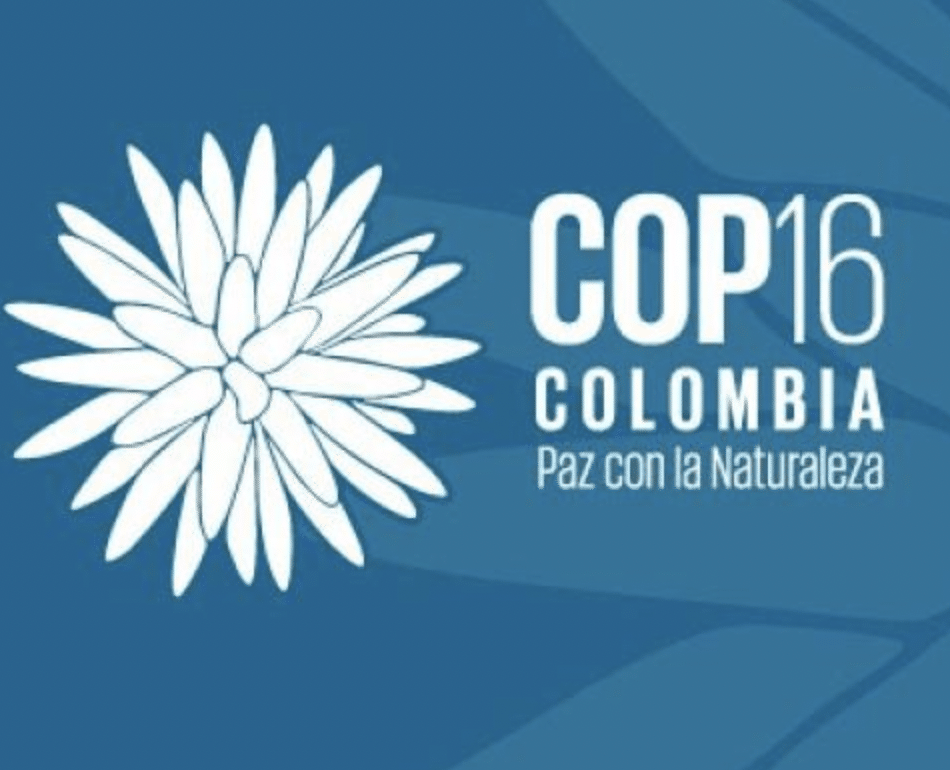
El segundo país más biodiverso del planeta recibe a la COP16 de biodiversidad durante el 21 y el 1 de noviembre de 2024. Delegaciones de 196 países se reúnen en Cali para informar cómo han traducido en acciones nacionales los objetivos del Marco Mundial de Diversidad Biológica Kunming-Montreal, establecidos en la COP15. También presentarán sus avances en la implementación del marco de diversidad biológica y Planes de Acción nacionales concretos. Desde Land is Life estamos convencidos de que no es posible garantizar la protección de la biodiversidad sin sus guardianes: los Pueblos Indígenas. Las mujeres Indígenas están listas para contribuir a los procesos de toma de decisiones en todos los niveles. Procedentes de las siete regiones socioculturales, ellas se han movilizado para impulsar su agenda en Cali y nosotros las acompañamos en dos eventos particulares: Elevando voces, asegurando futuros: Participación de los Pueblos y las mujeres Indígenas en movilización de recursos para la biodiversidad.Cuándo: 24 de octubre, a las 3:00 P.M Dónde: Zona Azul. Salón Nuquí – Salón Academia e Investigación Plaza Uno. Interpretación disponible: ESP- ENG 2. Protectoras de la vida: Mujeres Indígenas preservando la biodiversidad Cuándo: 30 de octubre, 12:30 P.M Dónde: Zona Azul. Pabellón de América Latina y el Caribe, la BIOdiversidad nos une. Con ánimo de aportar a la conversación, contribuir al posicionamiento de los Pueblos Indígenas en estos espacios y resaltar su rol en la protección y fomento de la biodiversidad; compartimos los siguientes documentos: El compromiso que necesitamos 17 financiadores anunciaron un compromiso histórico de US$1.7 mil millones en la COP26, en 2021, para avanzar en los derechos de tenencia forestal en países con bosques tropicales entre 2021 y 2025. En anticipación del anuncio de una Promesa 2.0, un grupo de 45 organizaciones de Pueblos Indígenas de África, Asia, América Latina, el Ártico y el Pacífico proporcionan recomendaciones estratégicas e ideas para informar y fortalecer los debates y resultados de la Promesa 2.0. 10 Razones por las que no se debe asociar a los Pueblos Indígenas con el término comunidades locales Tras la adopción de la Declaración de las Naciones Unidas sobre los derechos de los Pueblos Indígenas en 2007, se formó un consenso internacional en torno a la naturaleza específica de los Pueblos Indígenas. Los Estados comenzaron a alinear su terminología con el reconocimiento de los Pueblos Indígenas en la Declaración. Cuestiones clave que se abordarán en la COP16 Este documento es el resultado de cinco seminarios web que representaron una oportunidad para desarrollar la capacidad y los conocimientos de las mujeres y jóvenes Indígenas para su participación en la COP16 que tendrá lugar del 21 de octubre al 1 de noviembre de 2024 en Cali, Colombia. Estos son los temas a discutir y el papel de los pueblos indígenas en las próximas negociaciones
Land is Life at COP16

The second most biodiverse country on the planet will host COP16 on biodiversity from October 21 to November 1, 2024. Delegations from 196 countries will gather in Cali, Colombia, to report on how they have translated the goals of the Kunming-Montreal Global Biodiversity Framework, established at COP15, into national actions. They will also present their progress on implementing the biodiversity framework and concrete National Action Plans. At Land is Life, we are convinced that it is impossible to ensure the protection of biodiversity without its guardians: Indigenous Peoples. Indigenous women are ready to contribute to decision-making processes at all levels. Coming from seven sociocultural regions, they have mobilized to advance their agenda in Cali, and we will support them at two specific events: Raising voces, securing futures: Participation of Indigenous Peoples and women in Resources mobilization for biodiversity. When: October 24, at 3:00 PM Where: Zona Azul. Nuquí Room – Academia and Research Plaza Uno.Interpretation available: ESP-ENG 2. Protectors of Life: Indigenous Women Preserving Biodiversity. When: October 30, at 12:30 PMWhere: Zona Azul. Pabellón de América Latina y el Caribe, BIOdiversidad nos une. In the spirit of contributing to the conversation, supporting the positioning of Indigenous Peoples in these spaces, and highlighting their role in the protection and promotion of biodiversity, we share the following documents: The Pledge We Need Seventeen funders announced a historic commitment of $1.7 billion at COP26 in 2021 to advance forest tenure rights in tropical forest countries from 2021 to 2025. In anticipation of the announcement of a Promise 2.0, a group of 45 Indigenous Peoples organizations from Africa, Asia, Latin America, the Arctic, and the Pacific provide strategic recommendations and ideas to inform and strengthen the discussions and outcomes of Promise 2.0. 2. 10 Reasons Why Indigenous Peoples Should Not Be Associated with the Term Local Communities Following the adoption of the United Nations Declaration on the Rights of Indigenous Peoples in 2007, an international consensus was formed around the specific nature of Indigenous Peoples. States began to align their terminology with the recognition of Indigenous Peoples in the Declaration. 3. Key Issues to be Addressed at COP16This document is the result of five webinars that represented an opportunity to develop the capacity and knowledge of Indigenous women and youth for their participation in COP16, which will take place from October 21 to November 1, 2024, in Cali, Colombia. These are the topics to be discussed and the role of Indigenous Peoples in the upcoming negotiations.
Indigenous Women’s Program Fellowship
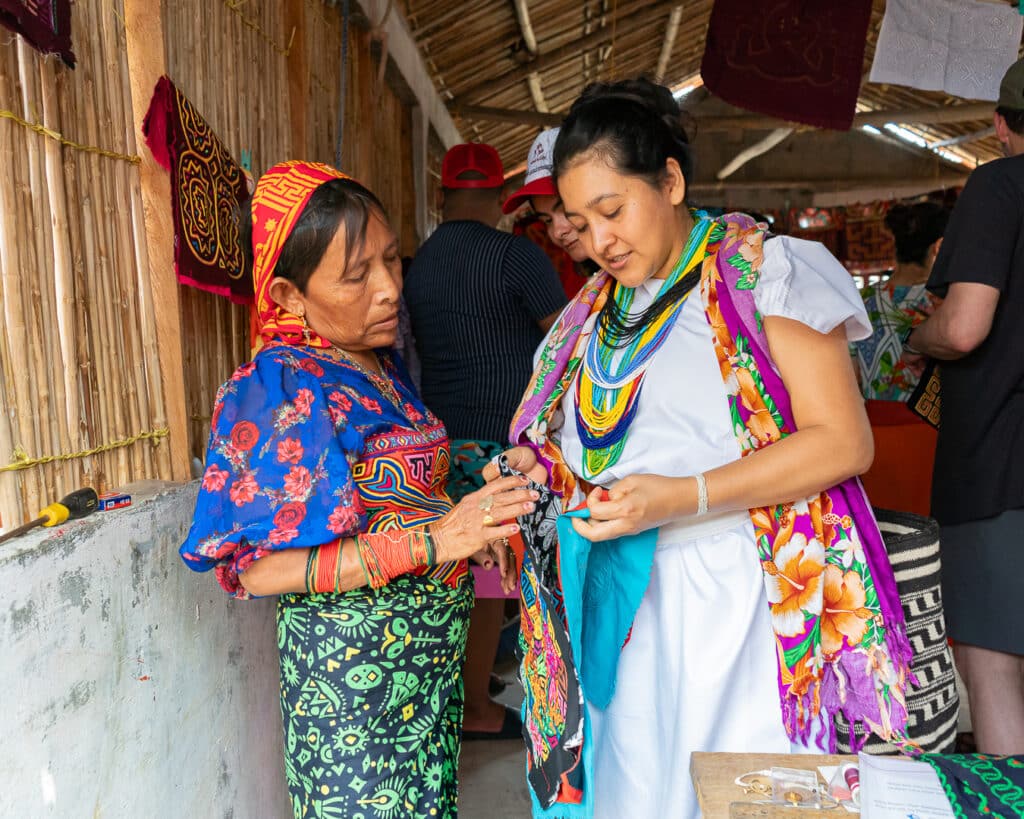
2025 – Cohort III Open call Registration period: from October 21st to November 24th, 2024 We invite fellowship applications that prioritize innovative projects advancing Indigenous Women’s rights and management of their land and natural resources. Land is Life will evaluate applicants based on their demonstrated experience in supporting Indigenous Peoples’ communities, their commitment to advancing Indigenous rights, the clarity and feasibility of project objectives related to Indigenous Women’s rights, as well as regional and age diversity, with a priority for supporting partner organizations within our network. About Indigenous Women’s Program Designed and led by Indigenous women, the program supports Indigenous women and their organizations – in Africa, Asia, and throughout the Americas – to effectively assert their individual and collective rights to access, to use and control land and natural resources, to improve their livelihoods, and to promote and protect their peoples’ rights. About the fellowship Under the Indigenous Women’s Program, the year-long fellowship helps to nurture the next generation of Indigenous women leaders by supporting young Indigenous women who are taking innovative actions that contribute to gender equality, the well-being of their communities, and the recognition of their land and resource rights. What do we offer? Financial Support Fellows receive: What do the fellows commit to? Who can apply? How to apply? Registration period: from October 21st to November 24th Results: By December 20th Starting date: January 13th ____________________________________________________________________________ Land is Life is a global coalition of Indigenous Peoples that works to advance the self-determination and collective rights of Indigenous Peoples in the world’s seven socio-cultural regions.
10 Reasons why indigenous peoples should not be conflated with the term local communities
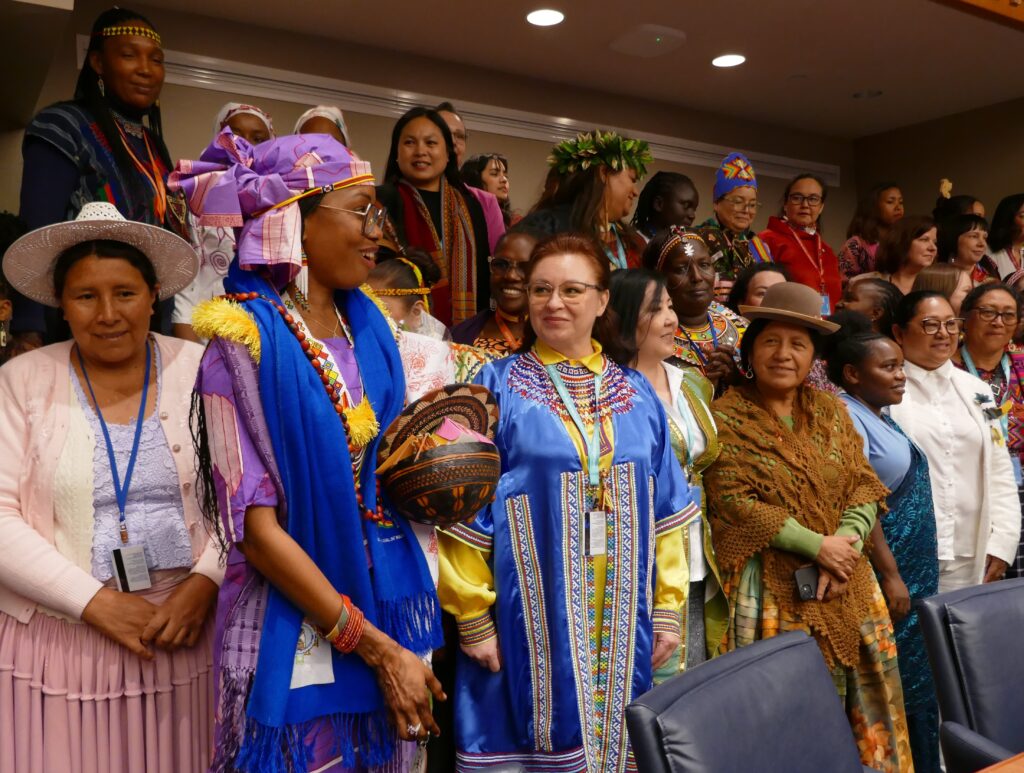
How did it start? The term “Indigenous Peoples and local communities” first emerged in international policy during the 1992 United Nations Conference on Environment and Development. This terminology was included in the Convention on Biological Diversity, Agenda 21, and the Rio Declaration on Environment and Development. By the mid-2000s, this phrase became common in conservation spaces, including usage by the UN Programme of Work on Protected Areas. During early discussions about drafting a UN Declaration on the Rights of Indigenous Peoples, the UN Working Group on Indigenous Populations helped states understand why the term “Peoples” was more appropriate than “populations,” “tribals,” or “peasants.” After the UN Declaration on the Rights of Indigenous Peoples was adopted in 2007, an international consensus formed around the distinct nature of Indigenous Peoples. States began aligning their terminology with the Declaration’s recognition of Indigenous Peoples. This shift was reflected in changes to UN procedures, such as renaming the “Special Rapporteur on the situation of human rights and fundamental freedoms of indigenous people” to the “Special Rapporteur on the rights of Indigenous Peoples.” Why Indigenous Peoples should not be conflated with the term “local communities”? What has been done? The United Nations Mechanisms related to Indigenous Peoples: the United Nations Permanent Forum on Indigenous Issues -UNPFII-, Expert Mechanism on the Rights of Indigenous Peoples -EMRIP- and the Special Rapporteur on the rights of Indigenous Peoples -UNSR- have issued recommendations according to their mandates requesting all UN entities to refrain from conflating or equating Indigenous Peoples with “local communities”. The three UN Mechanisms issued a joint statement made in Geneva in July 2023, urging “to cease the use of the term “local communities” alongside “Indigenous Peoples,” so that the term “Indigenous Peoples and local communities” is no longer used.” In continuing the efforts, the three UN Mechanisms met in Rome on February 26-28, 2024 with United Nations entities and Indigenous Peoples’ representatives, providing recommendations to “avoid perpetuating violations of human rights and the challenges faced by Indigenous Peoples due to grouping and conflating them with the term “local communities” or other categories.” These statements and recommendations do not seek to undermine “local communities” but are aimed at explicitly promoting and protecting the rights of Indigenous Peoples to ensure they are not diminished or otherwise compromised.